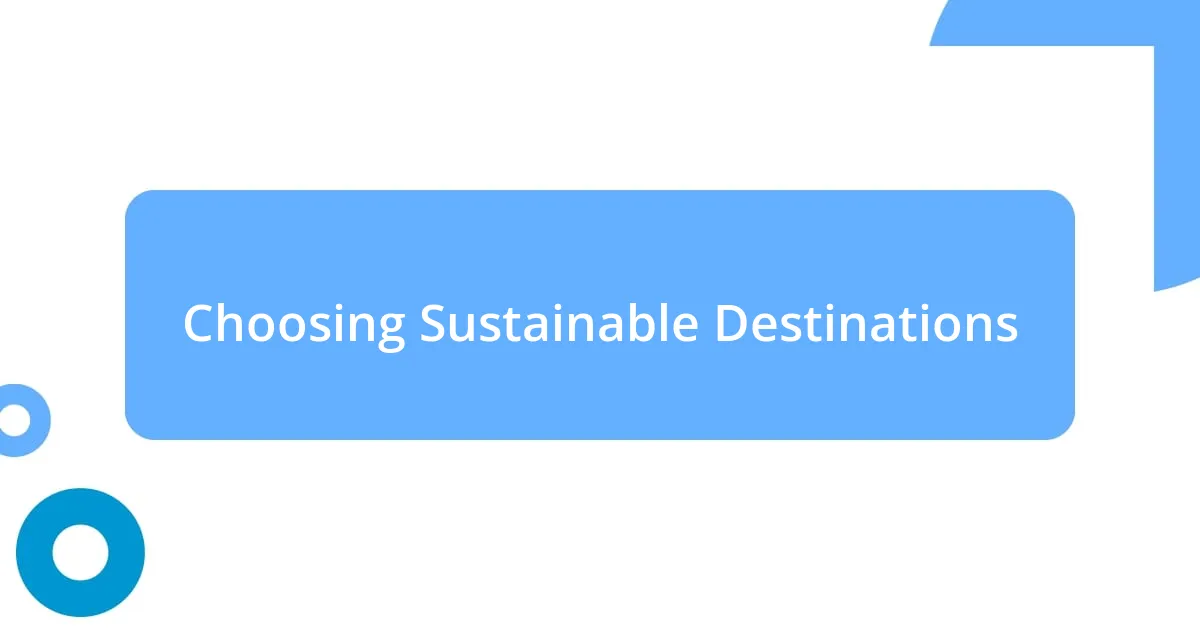Key takeaways:
- Eco-conscious travel emphasizes sustainable practices that preserve nature for future generations, such as choosing eco-friendly accommodations and reducing waste.
- Selecting sustainable destinations enhances the travel experience and supports local economies, with examples like Costa Rica’s eco-tourism and Portugal’s artisan support.
- Utilizing green transportation options, like biking or public transport, not only cuts carbon footprints but also deepens cultural immersion.
- Engaging with local communities through experiences like culinary tours and buying handmade souvenirs strengthens connections and supports local artisans.

Understanding Eco-Conscious Travel
Eco-conscious travel is about more than just visiting beautiful places; it’s a commitment to preserving them for future generations. I remember my trip to a national park where the guide shared stories of how tourism impacted the environment. It made me question: are we truly enjoying nature, or are we slowly harming it with our choices?
When I think about eco-conscious travel, I envision incorporating sustainable practices into every aspect of my journey. For instance, choosing local accommodations that prioritize green certifications not only reduces my carbon footprint but also supports the local economy. Could there be a better way to connect with a place than by staying in a community-focused guesthouse?
The emotional connection to the environment is paramount in eco-conscious travel. I once felt a powerful sense of responsibility after witnessing the effects of plastic waste on a pristine beach. It left me asking—what small changes can I make to ensure that such natural beauty is preserved? The answers lie in our daily choices, from opting for reusable water bottles to respecting wildlife habitats, fueling a deeper appreciation for our planet.

Choosing Sustainable Destinations
Choosing sustainable destinations is like selecting the ingredients for a great meal; each choice impacts the overall experience. For me, the hallmark of a sustainable destination is its commitment to environmental preservation and community well-being. On a trip to Costa Rica, I was blown away by how many places emphasize eco-tourism, showcasing their unique ecosystems while prioritizing conservation. Have you ever felt that sense of authenticity when visiting a location that values its natural beauty and culture? It’s truly inspiring.
I’ve found that researching a destination’s sustainability initiatives can reveal invaluable insights before you book your trip. For example, some regions have transitioned to renewable energy sources or promote local businesses that practice ethical tourism. One of my favorite memories is exploring a small village in Portugal where artisans proudly showcased their crafts, all while engaging in eco-friendly practices. It made me realize how rewarding it is to support places that genuinely care about their impact on the earth.
When planning your travels, consider not just where you want to go, but how your visit will affect those environments. There’s a remarkable peace in knowing that by choosing sustainable destinations, you’re contributing positively rather than merely consuming. I recall visiting a serene mountain town where tourism had been carefully managed to maintain its character, and it felt like a privilege to be part of that delicate balance. How do you want your travel footprint to look?
| Destination | Eco-Friendly Practices |
|---|---|
| Costa Rica | Forest conservation programs & eco-lodges |
| Portugal | Local artisan support & renewable energy |
| Norway | Electric public transport & green hotels |

Selecting Eco-Friendly Accommodations
Selecting eco-friendly accommodations can significantly enhance the overall sustainability of your travels. I remember booking a unique eco-lodge nestled in a forest, where every detail catered to preserving nature. It felt incredible to know that my stay contributed to local conservation efforts, and I immediately felt a connection to the surrounding ecosystem. Choosing accommodations with green certifications, like LEED or EarthCheck, helps ensure that you’re supporting places committed to sustainable practices, which enriches your travel experience.
When exploring options, here are some key aspects to consider for selecting eco-friendly accommodations:
- Certifications: Look for hotels or lodges with recognized environmental certifications. This gives credibility to their claims of sustainability.
- Locally Sourced Materials: Opt for places that use sustainable building materials or have energy-efficient designs. It’s impressive to see how this can enhance comfort and minimize energy use.
- Waste Management Practices: Check if your accommodation has initiatives for reducing waste, like composting and recycling programs.
- Water Conservation: Reach out to inquire about their water-saving measures, such as low-flow fixtures or greywater recycling systems.
- Community Engagement: Choose places that support local communities through fair hiring practices and by sourcing food from local farms. It creates a sense of camaraderie during your stay.
I vividly remember staying at a charming B&B in a coastal village where the owners incorporated recycled materials in their decor and served breakfast made from local produce. The pride in their sustainable choices added depth to my experience, making me appreciate the beauty around me even more. Staying in eco-friendly accommodations can transform your trip into an enriching journey, fostering a deeper respect for the destinations we cherish.

Using Green Transportation Options
Using green transportation options can greatly enhance your eco-conscious travel experience, and it’s something I truly cherish when I travel. I recall a trip to Amsterdam where I opted for a bicycle instead of a car. Pedaling through the city’s scenic canals, I felt a liberating connection to my surroundings. Not only did I reduce my carbon footprint, but the experience of exploring the city at my own pace was unforgettable. Isn’t it interesting how transportation can transform a trip?
Public transport can also be an incredibly sustainable choice. During my visit to Barcelona, I relied on the extensive metro system, which is powered by electricity from renewable sources. Each journey felt efficient, and the vibrant buzz of the city through the windows kept me engaged. I couldn’t help but wonder how many other travelers miss out on these authentic experiences simply because they choose to drive. By embracing public transportation, we not only lessen the impact on the environment but also soak in the local culture in a way cars never allow.
Additionally, considering options like electric vehicles or car-sharing services can be a game-changer. On a weekend getaway to San Francisco, I used a car-sharing app to access an electric car. It was comforting to know I was driving a vehicle with zero emissions, and the thrill of zipping around the hills without guilt enhanced my adventure. Have you ever had the chance to drive an electric car? The smoothness of the ride was delightful and added another layer of enjoyment to my trip—all while being kinder to the planet.

Supporting Local Communities
Supporting local communities not only enriches your travel experience but also fosters a genuine connection with the places you visit. I remember joining a culinary tour in a small town in Italy, where the locals shared their family recipes and cooking techniques. It felt like stepping into their kitchen, surrounded by laughter and the aroma of fresh herbs—a moment that transformed a simple meal into a cherished memory. How often do we get the chance to engage that deeply with a different culture?
Buying handmade souvenirs is another brilliant way to support local artisans. On my last trip to Bali, I visited a village known for its intricate wood carvings. The artist personally guided me through his workshop, sharing stories about each piece he crafted. The connection I felt as I purchased a unique carving was unparalleled. It wasn’t just a souvenir anymore; it was a token of a shared experience, a reminder of the beautiful person behind the artwork.
Additionally, seeking out restaurants that prioritize local ingredients amplifies the impact of your dining choices. Eating at a farm-to-table restaurant in the middle of the Australian outback was a delightful surprise. The farm operator came to our table and shared the journey of the meal we just enjoyed, from her land to our plates. It’s compelling to realize how our choices can help sustain local economies and promote culinary traditions. Have you ever found joy in the story behind your meal? It adds layers to our dining experience that are simply unforgettable.

Packing for Sustainable Travel
Packing wisely is a crucial step for any eco-conscious traveler. I always make sure to bring a reusable water bottle with me; not only does it keep me hydrated, but it also reduces plastic waste significantly. There’s something almost empowering about filling it up from a tap or water fountain and knowing I’ve made a small but meaningful choice for the environment. Have you ever considered how many plastic bottles we could save by simply reusing what we have?
Another essential for sustainable travel is choosing biodegradable toiletries. I vividly remember the first time I used soap bars instead of bottled products on a trip to Thailand. The lack of plastic packaging made me feel like I was contributing positively to the beautiful beaches and lush rainforests I explored. Each time I lathered up, I couldn’t help but smile, thinking about how my small choice could lead to a cleaner planet. Plus, these soaps often come in delightful scents that remind me of the exotic locales I visit.
Finally, packing light has its own sustainability perks. I make it a habit to limit my wardrobe to a few versatile pieces. During a recent backpacking journey through the Andes, I found that less truly is more. It was liberating not to haul around bulky luggage, allowing me to immerse myself more deeply in my adventures. Simplifying my packing made every hike easier and more enjoyable. Have you ever felt that thrill of discovering a new place when you’re not weighed down? It opens up a world of possibilities.














